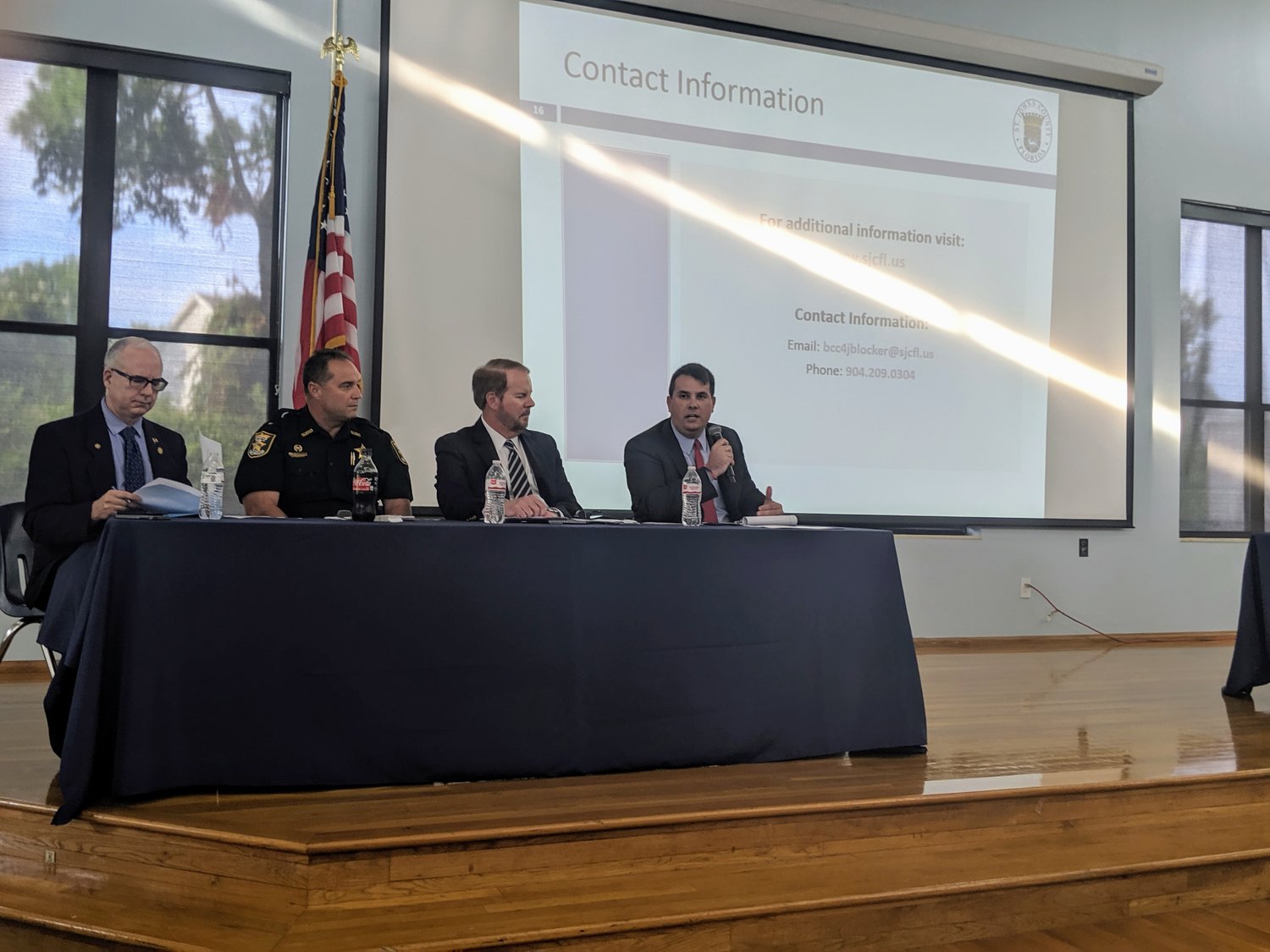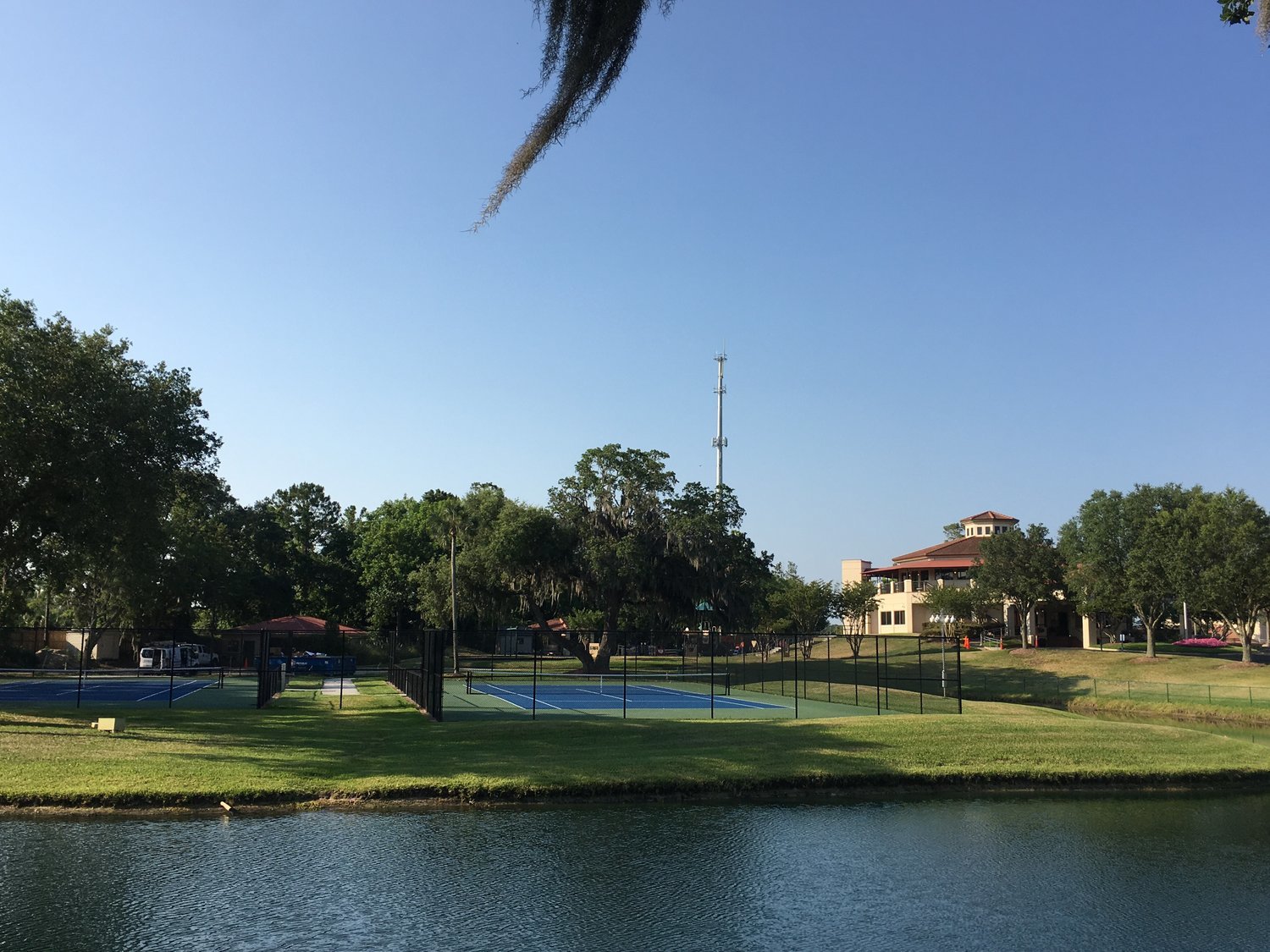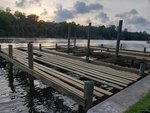Recent Town Hall meeting touches on residents’ concerns
The Q&A forum allowed community members to ask county officials about several hot button issues
St. Johns County representatives and officials took to the stage Aug. 7 to speak to residents directly, answering questions and listening to concerns. The public forum included District 4 County Commissioner Jeremiah Blocker, County Administrator Michael Wanchick, County Attorney Patrick McCormack and Commander Scott Beaver. The event was hosted at Our Lady Star of the Sea in Ponte Vedra.
During the Town Hall, recent local issues were raised, including traffic concerns, the Palm Valley wharf construction, Micklers Beach parking, the cell phone tower near the Bolles School and the Outpost development. Representatives were able to speak to community members directly concerning many controversial issues in order to provide insight from behind the scenes and dispel common misinformation.
Navigating growth and development
Commissioner Blocker spoke toward navigating St. Johns County’s development growth.
“This is a tremendous challenge for us as we are putting new developments and homes and commercial facilities for the county,” Blocker said. “There is a cost to that to every resident. It puts more of a strain on our law enforcement and firefighters. We have to be very mindful of that.”
Wanchick said that the county has identified some “short term” improvements to ease the resulting traffic, which includes intersection improvements to Solana Road and Dolphin Cove on A1A westside.
In addition, Commissioner Blocker stressed his dissatisfaction with the current impact fees attributed to homebuyers, which he says are the highest in the state.
“Impact fees are unfair to the community,” Blocker said. “They were designed to help alleviate the effects of growth, but they are no longer effective. If you have an active retired couple and they moved to the Dellwood community in Nocatee and they buy a home, they pay a substantial amount of impact fees to live there. They might drive a golf cart and they might have one vehicle, but they will pay tremendous impact fees. Then you have a young family with three or four children moving in a resale home in Nocatee, they pay no impact fees whatsoever. That's inherently unfair to the community.”
Blocker went on to say he was interested at looking at “mobility fees,” which he says better “capture how people are mobile and how that is paid for.”
Many community members were also interested in adding sidewalks, however Wanchick was quick to cite the county’s severe lack of funding and limited budget for projects. Regarding the area’s low taxes, he said it comes down to “where you want your quality of life and what are you willing to pay for.”
Commissioner Blocker also said that although the budget is limited, they are looking at solutions.
“Right now, the sidewalk budget is about $200K a year,” he said. “It’s woefully inadequate. We do need to increase that budget and hopefully we will. There is a safety issue and a quality of life issue so we will be addressing this.”
The limited budget not only affects sidewalks but the lack of parking at Micklers Beach, according to the Wanchick. He did mention, however, that they are looking into possible “public and private partnerships” to help alleviate the overcrowded facility.
Mickler’s Wharf project
Concerning the recent wharf construction on Roscoe Boulevard and the controversy with possible safety issues, Wanchick said it is a “project they have a right to build.”
“The wharf is an interesting project because the only reason it appeared before the board of county commissioners is because we own the roadway right there on Roscoe,” he said. “We have no jurisdiction as a county over the wharf itself.... There is this belief that we saw plans and or we improved plans to the wharf. The only plans we saw were conceptual plans which was attached to a permit application, which was granted by the county commissioners. We do not control the how the structure was built whatsoever.”
he county did take note of the community’s concern over the construction, however. Attorney Patrick McCormack said that the county is now looking into expanding the “neighborhood Bill of Rights,” in order to improve public notice, which he regrets, “was not something that had happened in this scenario.”
“Nobody likes a surprise,” he said.
Cell phone tower concerns
any residents have been concerned about a monopole cellphone tower that was constructed adjacent to the Bolles School playground. The pole was part of plans the PGA TOUR’s construction of their world headquarters. Some parents were concerned that possible radiation emitted from the tower could be cancerous.
Wanchick said that the PGA TOUR was being very cooperative about the community’s concerns and they were working toward a resolution. Although there has been no “final solution,” the TOUR is currently “looking at other options,” and they are very hopeful for positive outcome.
“To the PGA TOUR’s credit, I think we will find the best possible solution,” Wanchick said.
Outpost development
Many supporters of Save Guana Now attended the Town Hall in hopes to learn more about the county’s position about the Outpost development before the final decision goes to the board in September, with the PZA meeting at 3:30 p.m. Aug. 15 in the County Auditorium, County Administration Building, 500 Sebastian View in St. Augustine.
“I have received, as of right before my being here, easily over 500 emails in opposition to this project,” said Blocker. “We talked about community engagement that there has been substantial community engagement on this issue. The feedback is overwhelming.”
Blocker went on to note that he has yet to see the final project and will evaluate it without bias.
“I know you have some concerns,” he said. “I have some environmental concerns and I have some traffic concerns. But I still have to review the final product because it hasn't gone to the final vetting period. I'm willing to be impartial and make sure that this project is evaluated like if any citizen in this audience wanted to make adjustments to their land or their property, they should have the right and ability under the law to follow that process and be evaluated by the staff that is fair and impartial.”
McCormick weighed in his perspective at the discussion, asking citizens that wanted to participate in the discussion to take note of “competent substantial evidence,” the law calls for and present information that would directly appeal to the county’s planning and development code.
How many people like something or don’t like something is not really within the criteria,” McCormick said. “Ultimately, it’s a fact-based, code-based type of thing. General comments like ‘the traffic will be hazardous’ (won’t work). The board can’t use that to base their decision. If there are comments like ‘I checked with the sheriff’s office and there were 13 accidents in these 13 miles stretch last year and here are the records.’ That works.”












